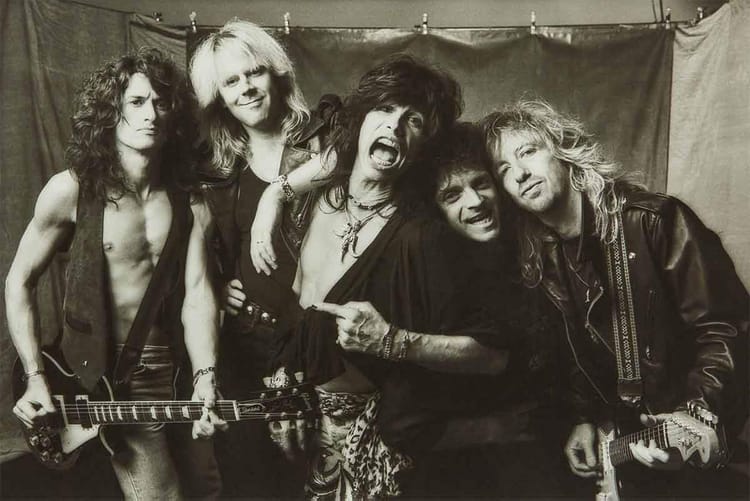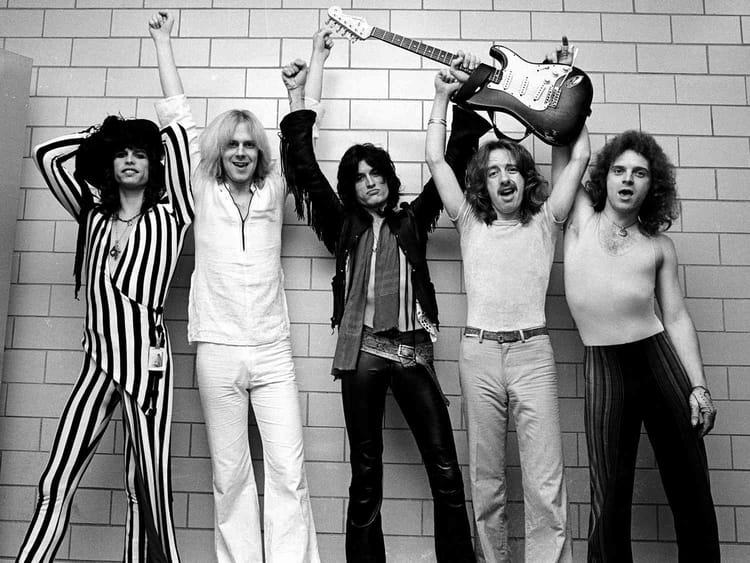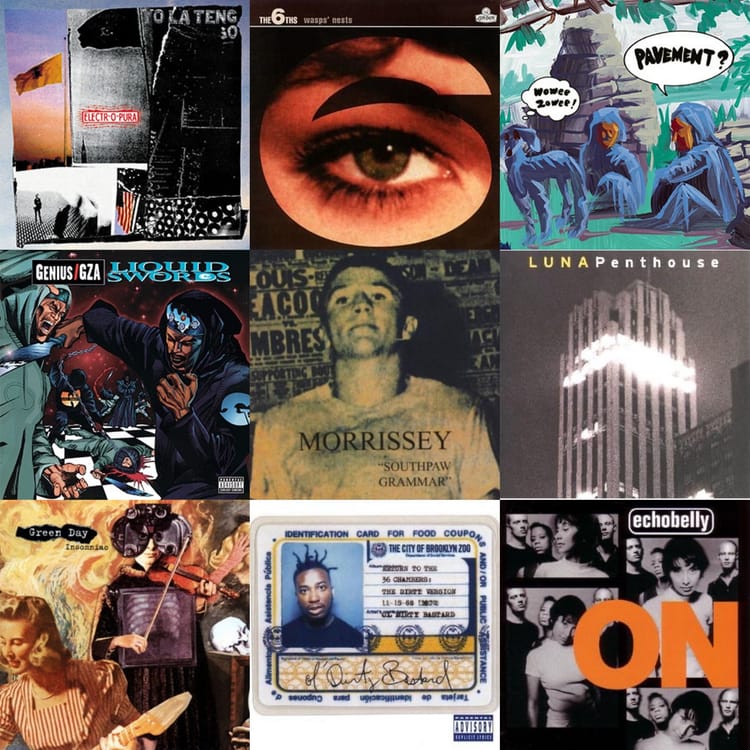Sleater-Kinney, pt. 1: Anthony's Album Guide

My handy dandy profoundly subjective numerical rating scheme is decoded here.
GLIB BOY ALERT: If you’re aghast to see an average rating below 8.0 here, feel free to write my take off as that of an obnoxious boy. I can’t deny that I qualify.
Sleater-Kinney (1995) 7
Call The Doctor (1996) 9
Dig Me Out (1997) 9
The Hot Rock (1999) 7
All Hands On The Bad One (2000) 7
One Beat (2002) 6
The Woods (2005) 7
Sleater-Kinney began when Olympia, Washington riot grrrls Corin Tucker (of duo Heavens To Betsy) and Carrie Brownstein (of trio Excuse 17) bashed out an album overnight during a trip to Melbourne, Australia in 1994, joined by local drummer Lora MacFarlane. The self-titled outcome (named after an I-5 exit back home) is pretty one-note. That note, one not without validity, is “boys, sex with you is equitable to death.” But “The Day I Went Away” and “Be Yr Mama” respectively show how invigorating the combination of their voices and guitars could be, Brownstein’s wit bolstering the anthemic fury Tucker had already revealed on Heavens To Betsy’s harrowing album Calculated.
Sleater-Kinney in 1995: 1/3 Aussie, not yet American heroes.
HTB and Excuse 17 were done by the time Sleater-Kinney was released in ’95, MacFarlane then flown up from Melbourne to help craft the follow-up. S-K now Tucker and Brownstein’s primary focus, Call The Doctor is a stunning leap forward. The lack of a bassist makes it all the more dramatic when MacFarlane and Brownstein stop dancing around the steady chug of Tucker’s chords and join in the pummel, their voices playing a similar counterpoint to Tucker’s commanding holler. The chorus of “Stay Where You Are” suggests The Raincoats coming for Hüsker Dü’s lunch. Needless to say, critics and cool kids were thrilled.
After a half-decade of American indie guitar groups stoking mainstream attention only to (understandably) recoil from the risk of commercial compromise, titles like “I Wanna Be Your Joey Ramone,” backed by irony-obliterating riffage, were both unprecedented and welcome, especially in a year where half the Top 40 airplay chart was “alternative rock” from fading veteran acts and novelty flukes both credible (Butthole Surfers) and not (Primitive Radio Gods). “Good Things” was an arresting mid-tempo heartbreaker, the kind of AOR move only multi-platinum acts like Green Day and Pearl Jam would dare at the time. With the Sonic Youth/Hole Lollapalooza tour followed by the Metallica/Soundgarden one, the galvanizing feminist spirit on Call The Doctor revitalized the romantic underground dream of the ‘90s. At least for the nerds who needed it.
"Call The Doctor," at CBGBs in 1997.
After MacFarlane surrendered to the cold hard truth of work visas, Tucker and Brownstein eventually settled on Janet Weiss of Quasi as their new drummer, releasing Dig Me Out in 1997. Weiss, adding a rumbling professionalism without losing the post-punk sensibility, was the perfect third for an album even more authoritative and affecting than the previous. Apparently a bit of a Rumours (SPIN rudely revealing Tucker and Brownstein were more than just friends), all interpersonal issues behind the scenes just enliven the musical alchemy, the pleading “One More Hour” and the demanding “Turn It On” conveying romantic desire rather than soap. Their confidence is bracing throughout, whether paying tribute to the expressive potential of rock’n’roll (“It’s Enough”) or challenging its fans to meet it (“Not What You Want”).
“Little Babies” might be their greatest, and most underappreciated subversion of rock heteronormativity: rare is the band who admits maternal feelings for their fans, let alone with the bounciest chorus of their career and a knowing wink at “Mother’s Little Helper.” For all the glory that precedes it, the final three songs on Dig Me Out might be the most impressive album coda I’ve been old enough to hear the year of release: “Things You Say”’s oh-so-underrated description of transcending fear, followed by “Dance Song ’97”’s heavenly tribute to Cindy and Ricky Wilson, and the desperate climax “Jenny,” Brownstein and Tucker’s arena-sized ache conflating Lindsey and Stevie with Page and Plant.
"Turn It On"! Live! Bumbershoot '97!
So what do you for an encore when you’ve made the best rock album of the ‘90s, your one-time Riot Grrrl side-project now earning Page/Plant comparisons, but you don’t feel like leaving Kill Rock Stars for Interscope? In Sleater-Kinney’s case, you trade producer John Goodmanson for Roger Moutentot, best known for helping Yo La Tengo evolve musically without ever leaving the indies. Just like Pearl Jam, Green Day, and all the arena gods they ranked among in theory, Sleater-Kinney wanted to find a tasteful way to mature…despite this TRL thing suggesting the world might not even care.
I spent a whole spring break sulking about…oh, everything…to The Hot Rock when it dropped. And that inner young adult can’t believe I’ve spent the last decade or so ranking this album a 7. But my disappointment with their 21st century evolution has left a retroactive stain. For every beautiful, vulnerable treasure like “A Quarter To Three” or the title track, there’s a song about how they aren’t afraid of Y2K. For every “Get Up” that shimmeringly shows what they can milk from a single chord progression, there’s a “Living In Exile” that’s just…there. The Hot Rock found them at a precarious edge, and suffers from knowing how they fell off. (Again, feel free to say “pssh!” and write me off at any time, royalists.)
My spring break soundtrack in 1999. And no, I wasn't at the beach.
The chafe between indie introspection and self-conscious heroism is only made more explicit on All Hands On The Bad One, which grabs me every time the song expresses insecurity or tenderness (“Was It A Lie?”, “Leave You Behind,” “The Swimmer”) and has me rolling my eyes whenever it’s judgmental or vain (“Ballad Of A Ladyman,” “Male Model,” “Pompeii”). Most excruciating might be the European fantasy “Milkshake & Honey” - only their first bit of whimsical accent play - but over time I’ve found the single “You’re No Rock & Roll Fun” even more frustrating. This lively, but ironically whiny, Goldilocks claim on the parameters of “rock & roll fun” is more female friendly than the norm, if no less reactionary. And maybe a little more tepid. (Again, your mileage - and empathy for defensive women in rock - may vary.)
I didn’t have any of these beefs at the time, which I could prove if I hadn’t destroyed all copies of my 2000 radio interview with Janet Weiss, quickly horrified by the frequency with which I said “…yeah.” But the great unclicking came for me on One Beat, the 2002 album treated by critics as the thinking rocker’s American Idiot. Slower and longer than earlier efforts (the average song length had gone up a minute from Dig Me Out), One Beat felt as thinly bombastic as…well…American Idiot. Pressed for an album that felt cathartically evocative in that terrible time post-9/11 (if that's your kink), I'd go with the paranoid, anti-macho frenzy of Rocket From The Crypt's Live From Camp X-Ray. It's only half as long as Idiot, too!
"Step Aside"! Live! Conan '02!
I don’t hate Idiot's title song or “Holiday,” though. Similarly, One Beat has the joyous protest march “Step Aside” (horns! a call-and-response bridge!). There’s also the playfully lusty “Oh,” where Tucker - now married with child to filmmaker Lance Bangs - suggests sex with boys has improved (“I call it my rocket!”). But beyond those two highlights, the album is sodden and repetitive. Again and again, Brownstein yelps in a comic accent over choppy - sometimes almost orientalist - riffs, Tucker screaming the chorus. People were thrilled by this? As for the Stephen Trask collaboration “Prisstina”…well, I’m glad they’re having fun. The outtake “Lions And Tigers,” a grateful, worried tribute to young Marshall Tucker Bangs (coolest rock spawn name ever), affected me more than anything on the album proper.
Guaranteed four stars minimum from music mags and indifference from outside the cult, adored by their peers but hitting a commercial ceiling at Pearl Jam Opening Act, the group finally left Kill Rock Stars for the superior distribution of Sub Pop. Having returned to Goodmanson after The Hot Rock, they left again to work with Dave Fridmann of Flaming Lips fame. Fridmann reportedly wasn’t much of a fan before taking the gig, and the resulting adventures in audio overload on The Woods can seem indifferent rather than inspired.
Oh, the irony of this song having a video edit.
Full disclosure: I’m embarrassed by the naive overreach of my 2005 Woods review for Stylus (has it really been twenty years?). It will never be my place to give pointers on fighting patriarchy. But I think St. Anger remains a valid comparison point, and I’m still torn between loving Brownstein’s over-the-top outrage about those who merely “Entertain” (however ironic she’s made it since) and boggling at the godawful guitar solo that nearly sinks the track. The Woods has some of their most thrilling moments as Established Indie Gods - “Jumpers” and “Rollercoaster” joyfully unhinged at their climaxes - surrounded by dollops of mere rockola, if not hapless noise.
While fans refused to admit any perceptible drift or self-doubt on S-K’s part (God, I felt like Cassandra!), the conflicted trio then took a decade off. Tucker played with her solo band and her kids, Weiss played with every singer-songwriter who’d ask (most notably Stephen Malkmus and Conor Oberst), and Brownstein played with Fred Armisen on IFC. Brownstein also did an American Express ad, even saying her name in it. Hey, if you’ll have the occasional snarky boy judging everything, anyway…get paid. From what I’ve seen, fans will mostly disassociate and deny it happened.
If you're a woman between the ages of 60 and 40 and refuse to admit this ad exists...I can't blame you.
Mission creep was belatedly acknowledged when Janet Weiss left the group rather than promote the synth-happy, St. Vincent-produced, second reunion album (St. Vincent also starred in Brownstein’s directorial debut, The Nowhere Inn, a meta faux-doc about "celebrity" fans politely ignored). Ironically, I don’t have any sense Sleater-Kinney became particularly better or worse in recent years, which I probably won’t write about. Brownstein and Tucker are still incredibly charming (I adore both of Tucker's What’s In My Bag? appearances, whether playing off Brownstein or Filthy Friends' bandmate Peter Buck), and they're still capable of writing a decent song. They also continue to struggle with being superstars to some and nobodies to others, bursting with ambition but hindered by self-awareness and second-guessing.
Unlike Yo La Tengo, music qua music has not been goal enough for Sleater-Kinney: they want to be your Joey Ramone, not your Richard Thompson. I’m not without sympathy, but I also find it hard to go higher than a 7. Maybe they’ll treat a drummer as an equal again someday, or maybe they’ll find a creative context that doesn’t require it. But until then, I can’t pretend they weren’t more thrilling with something to prove, rather than a stature to affirm.
Well, I try to be.
Dig Me Out and Call The Doctor are respectively at 15 and 70 on My Top 300 Albums Of All Time, so don't you dare call me a hater! Sleater-Kinney are a very important band in my rock canon! If you have something to say without pretending otherwise, by all means, all hands on the "send" button to anthonyisright at gmail dot com.




